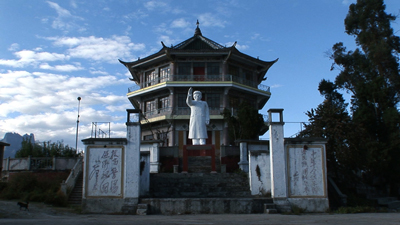 A slow ramble through a Yunnan squatter village
A slow ramble through a Yunnan squatter villageThis DV documentary, the Chinese entry into the NYFF, has so far flown below the radar. Scott Foundas, of the NYFF selection committee, has commented that Zhao Dayong seems like another Jia Zhang-ke.
Jia's work, certainly outstanding for his generation of Chinese filmmakers, has not been uniformly excellent, but it's an overstatement to link this overlong, unselective filming with such perceptive auteur film-making as Jia's -- though they have a common subject: the ravages of modern Chinese "progress."
Ghost Town is a bit of a misnomer, to begin with. A ghost town is usually empty. This one, high up in the Yunnam mountains in a region of considerably physical beauty, isn't void of people, just cut off from the mainstream of booming Chinese capitalism, and one of the people filmed predicts that in a couple of years the remaining population will probably be expelled because they live on property owned by the state.
The
website "Chinese Independent Documentary Film Archive describes Zhang's subject matter better than I can (and the whole web page sets it in the context of a general documentary project): "Zhiziluo is a ghost town full of life. Lisu and Nu minority villagers squat in the abandoned halls of this remote former communist county seat, where Cultural Revolution slogans fade into the shadows of the old city hall, and a blank white figure of Chairman Mao gazes out silently to the wild mountain wilderness of the Salween River Valley in China’s southwest Yunnan province."
The film, which runs to nearly three hours, is divided into three parts. Their titles, "Voices," "Recollections," and "Innocence" aren't very descriptive -- a sign of the main failing of the film, that it's simply not organized or structured well enough. The first concerns a Christian minister and his father and focuses on their monologues to the camera about their experiences. The old man was imprisoned during the Cultural Revolution, he explains, under conditions that caused 90% of the prisoners' deaths. His son, who spends some time researching the issue of whether music is forbidden in the Bible, says that his father no longer treats him like a son. He thinks that may be the result of the horrors he suffered.
The second part ostensibly focuses on a young couple whose romance is threatened by the fact that outsiders want to purchase the girl from her parents as a bride, as well as the boy's discontent with his hardscrabble existence as a driver and desire to leave to seek better work, which he eventually does. But though the boy and girl evidently do like each other, there's little evidence of romance or even much time spent together. And Zhao seems too willing to let his camera follow whatever random events come in front of it, from an recalcitrant ox to wandering roosters and dogs across the dirt main street to a town drunk whose mother hates him and whose sister runs an empty-looking restaurant.
The third part concerns a boy who has been abandoned by his father and spends his time fantasizing and playing games.
Clearly Zhang Dayong excels in his patience and ability to gain the confidence of his subjects. His willingness to keep in moments when they talk to him or note the presence of the camera are not unwelcome Brechtian wake-up calls. The subtitles are excellent, not only idiomatic but unusually clear and readable. If you remember the subtitles for Hong Kong movies (even Wong Kar0wai's) in the Eighties, which were ungrammatical and flickering, you will appreciate this. Zhang (not alone in this) is troubled by the way the rapacious march of economic progress in China, following upon the destruction of lives wrought by the Cultural Revolution, is causing cultures to vanish.
The director is quoted as saying, "I wanted to explore the idea of these lost histories and ravaged cultures, and by extension my own cultural identity, by delving into the lives and spirit of the abandoned city." Hopefully he will move on to explore this subject to more effect. The division into three parts this time implies more structure and more focus than the film really has. Randomness has its place, especially in depicting aimless lives. But so does sharp editing.
This official selection of the 2009 New York Film Festival does point into a new direction: contemporary Chinese documentaries. Of course Asian filmmaking in particularly today often involves a lot of documentary elements. Take for example the festival prize-winner, Liang Ying's 2006
Taking Father Home, which seems very overrated, but is a masterpiece of taut storytelling compared to
Ghost Town Anyway, as a
piece on the website of dGenerate, distributors of the film, notes about the inclusion of Zhang Dayong in the 2009 NYFF: "Zhao’s depiction of contemporary China in Ghost Town will provide a stark counterpoint to the Festival’s special showcase: a retrospective of classic Chinese films from 1949-1966 to mark the 60th anniversary of the People’s Republic of China. (This is the third major retrospective of Chinese cinema to be showcased by the Film Society of Lincoln Center in the last five years, following the NYFF tribute to the Shaw Brothers Studios in 2004, and the FSLC celebration of Chinese cinema’s centennial in 2005.)"
As noted, an official selection of the New York Film Festival at Lincoln Center for 2009.





